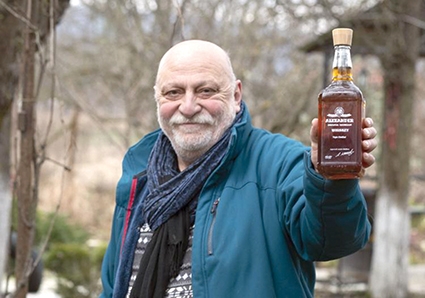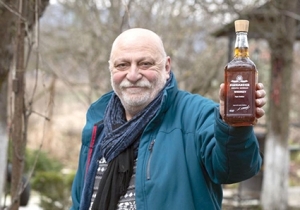Georgian Qvevri Whisky Produced for the First Time
The ancient Georgian tradition of Qvevri has been used for centuries to age, make, and store Georgia’s famous wines. The egg-shaped earthenware vessel is filled with grapes, including the skins, stalks and pips, before being sealed and buried underground. After five to six months, the mixture turns into delicious wine. The tradition of the Qvevri reflects Georgia’s rich culture. UNESCO named the Qvevri technique of winemaking an Intangible Cultural Heritage of Humanity.
Although the Qvevri method is usually associated with wine, one Georgian has set about using it to make another type of alcohol: Aleksander Kvernadze has created Qvevri whisky for the first time in Georgia.
Aleksander is based in Alekseevka village in the municipality of Tetritskharo. His company ‘Alexander Distillery,’ produces various wines, sharbat (a subcontinental drink made from fruits or flower petals) and chacha. Now he has made whisky production his main profession.
Aleksander first began making chacha in Qvevri and then began exploring the distillation of grains like corn, barley and rye in oak barrels. He believes that the clay of the Qvevri purifies the alcohol unlike other distillation techniques.
“I think the forms of the Qvevri is also very important,” said Aleksander in an interview with the delegation of the European Union to Georgia. “The distilled product is absolutely free of raw brandy oils and the taste is wonderful,” he affirmed.
The Aleksander Distillery is a craft and family-run distillery that produces around 100 to 200 bottles a year. This year, Aleksander expects to produce 250 bottles of Asuretuli Shavi wine as well as chacha and whisky.
He was able to develop his distillery with help from the EU-supported Tetritskaro ‘Local Action Group’ (LAG) established within the EU-funded project ‘Rural Development for Sustainable Growth of the Tetritskaro Municipality’ under the second phase of the European Neighborhood Program for Agriculture and Rural Development (ENPARD).
The four-year project, with a budget of €2.4 mln, hopes to improve living standards in the Tetritskaro municipality by implementing innovative socio-economic models and combining civil, private and public sectors for local development.
The LAG consists of members from various religious and ethnic minorities, eco-migrants, and internally displaced persons. 40% of LAG are women and 30% are youth.
With the help of the program, Aleksander Kvernadze will expand his business to increase whisky production to three times the current rate to around 300 liters. He will also improve and expand the wine cellar and implement new technologies.
He expects sales to grow accordingly. His products are already in demand in Europe, Asia and the US and his whisky has passed US accreditation. “There is a high demand for our products, but so far our resources have been limited,” said Aleksander.
With the continued support of EU-funded projects in the region, life in rural Georgia should become easier. However, not all residents agree to accepting funding. “Many people in Georgia do not believe in the opportunities of funding to develop a business idea,” said Aleksander.
Nonetheless, he hopes that people will follow his lead and begin to establish their own businesses. Afterall, “everything does not happen at once, but gradual and constant development is important,” he concludes.
By Amy Jones












